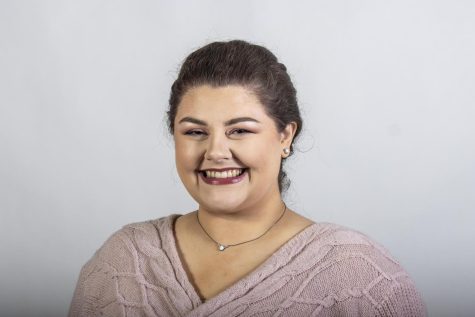Recovering from sexual assault mentally, physically
Elise Keane, a sophomore neuroscience major, poses for a picture Monday evening,.
April 13, 2022
Sexual assault can have many impacts on survivors in multiple ways afterwards and even years later.
Following sexual assault, many experience various effects on their mental health, which could include:
- Anxiety disorders
- Depression
- Post Traumatic Stress Disorder
- Disordered eating
- Problems sleeping
A survey by the Rape, Abuse & Incest National Network focused on teenage girls who have been sexually assaulted, showed that in the following few months, 80 percent developed one mental health disorder and 55 percent developed two.
A local non-profit organization Sexual Assault Counseling and Information Service, SACIS, provides counseling, advocacy and information to Coles, Cumberland and southern Clark County.
Alyssa Cravens, the victim awareness campaign specialist for SACIS, explained one of SACIS’ services- medical advocacy.
“One of the most immediate things we provide is medical advocacy,” Cravens said. “So if someone has been sexually assaulted and they would like to get a rape kit done, or they just want to be checked out by a sexual assault examiner/nurse, they can go to the hospital and let the hospital know that they would like an advocate. Or they can call themselves and one of our trained medical advocates will come and just make sure that the survivors’ rights and needs are being taken care of. And a lot of times, survivors might not want someone they know there right away, but they still have that emotional support from an advocate.”
Cravens also talked about SACIS’ two other main services provided.
“We also do legal advocacy,” Cravens said. “So if someone wanted to pursue a stalking no contact order or just an order of protection, whether it’s on campus or actually through Coles County or the county where it occurred. We can help with the court process and the paperwork process. We can also help with actual court cases. And then we offer counseling and all of our services are completely free and confidential.
For many who have been sexually assaulted before, trusting and starting to date or have sex again can be difficult.
For Eastern student Elise Keane, a sophomore neuroscience major who was assaulted in the past, there was a learning curve for dating and being sexually active after the assault.
“My entire teen life was trying to reconstruct the relationship I had with my childlike self and somehow reconnect to my still trying to be a teenager at the same time is a difficult balance between the two,” Keane said. “I made mistakes in relationships with choosing the people that were maybe not the best for me, but felt the most comfortable because that’s what I was used to previously… Then trying to figure out where does my trauma settle into my identity as a whole and navigating that was a little difficult, but I have a good grasp on it now for the most part.”
Keane explained how being rushed to grow up after being assaulted at a young age impacted what they thought they were ready for in their teens.
“I feel like in high school, I really rushed into adult relationships because I felt like I needed that stability,” Keane said. “I really pushed myself a lot farther than I needed to go because I was overcompensating for what had happened to me. I threw myself into sex way too early because it felt like that was what I was used to, so it made sense to go back to that place.”
When it comes to dating, Keane slowly learns to trust again while staying within their comfort and safety zone.
This includes safety measures set up with friends before going on a date and learning how to adapt and explain their triggers from their assault to someone they barely know.
“I have certain things that I have in place [for dates],” Keane said. “I always send my friends a geolocation thing. Like here’s where I plan to be, and if you see me moving and if I don’t tell you otherwise, maybe check in on me. It’s always very difficult to trust someone enough to have what I deemed a conversation prior to anything happening.”
The need to trust someone to explain what has happened to Keane in the past stems from Keane’s triggers from their assault.
“I would like to be this happy go lucky and super into you, and even if I am, but you just happen to brush up against [triggering part of their arm] something that connects to my brain is still so foundational,” Keane said. “That maybe I don’t like this person, maybe it’s a lie, maybe I’m not attracted to anybody, which isn’t true, but it feels that way at the moment.”
Preventing triggering moments is important because it leaves the person triggered in a vulnerable position in which they feel like they are in danger.
“Reasonably, I can talk through the fact I’m safe… But I’m immediately set back to this place where I feel unsafe and in danger,” Keane said.
Cravens called the process after an assault a “healing journey.”
“A lot of times you see all sorts of feelings associated with the trauma of sexual assault, and those can include anger, fear, sadness, shame,” Cravens said. “And because it’s trauma, those just kind of come and go at random times, which is why a lot of times people refer to it as a healing journey for survivors. Because it’s very abstract, there is no cycle that everyone goes through, and there’s no two stories that are the same. It has different mental health effects on everyone.”
Another part of dating and sexual relationships that is hard for Keane is trusting the other person with themselves, and that the other will not abuse that trust.
“I have a very hard time letting go of my body, of pieces of myself, because in order to commit in a relationship you have to give up pieces of yourself to the person that you’re with,” Keane said. “And oftentimes, giving up pieces of yourself means that you have to let them in a way that you maybe have not let people in before.”
A vital part of Keane’s ability to date and have sexual relationships now comes from the support they had in their teens while recovering from their trauma.
“I didn’t have any friends in high school that I could talk to about this,” Keane said. “I didn’t have any people besides my mom and my therapist that I could really just share every inner thought too… Without that support, I don’t think that I would have the relationship that I have with my body now.”
Cravens stressed the importance of a support system for survivors while they process what happened.
“There’s a lot of feeling of shock or disbelief and just kind of processing what happened,” Cravens said. “And sometimes the process of processing what’s happened to you takes a while, which is why support systems like friends or counselors or mental health professionals are a good idea in our options for survivors.”
A common experience after a traumatic event is blaming yourself. Keane explained how those raised female, are told to blame themselves for sexual assault or harassment.
“Especially as people who are raised female, we were taught our entire lives that the things that happen to us are because of us,” Keane said. “Even if your parents had it instilled that that was not true. That doesn’t matter because your entire childhood was being told boys will be boys, and that things are going to happen to you. And that you’re going to get catcalled on the bus.”
Keane explained the process those raised female grow up thinking.
“You’re going to go from fourth grade on thinking that everything that happened was your fault,” Keane said. “Because that’s what you’ve been told, you have no other evidence as to why, and then you get in a relationship with a bad person who makes you feel like shit. Who just gaslights you and makes you feel like you did everything wrong.”
For Keane personally, they have had to tell themselves it was not their fault what happened.
“I had to constantly reason with the fact that I did nothing wrong even when it felt like everything I did led up to this very moment and then what I did was inexcusable,” Keane said. “I came to a point where I basically just have to reckon with the fact that I’m responsible for my emotions and my feelings only.”
There is one thing Keane wishes for other survivors to remember.
“I want people who are reading this and have had a traumatic event to know that that does not define your life, and that love does come after trauma and that you deserve a happy, healthy, fulfilled life,” Keane said. “And if you choose so, a happy, healthy, fulfilled sex life. It’s really important to put yourself back out there with people that you feel comfortable with and that it’s OK. It’s OK to feel pleasure in places that have been hurt before. That doesn’t mean that you’re broken.”
Madelyn Kidd can be reached at 581-2812 or at mekidd@eiu.edu.





































































